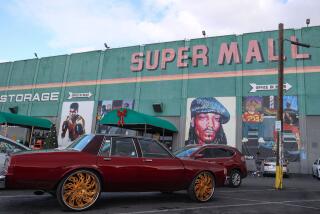Used Car Wheeler-Dealers and ‘Commodity Brokers’ Strike It Rich : Soviet Far East: Importing vehicles from Japan or expediting exchanges of goods, middlemen are plunging into the budding free market.
- Share via
KHABAROVSK, Soviet Union — Standing in a vast lot filled with Japanese cars on the wooded periphery of Khabarovsk, Gennady Tizhin huddled against a winter gale in his sleek, black leather coat and tapped a brown, tasseled loafer against a tire.
“There’s a new aristocracy being built in this country, and I want to be part of it,” Tizhin mused. “I want to be rich.”
Tizhin, 28, is part of a small but growing band of savvy young entrepreneurs who have made fortunes in recent months by moving adroitly to exploit the Soviet Union’s slow but steady drift to a free-market economy.
Tizhin is a dealer in Japanese used cars, exploiting quirks of the law in Japan, where old vehicles lose their value steeply, and pent-up Soviet demand for private transportation to import the cars and sell them at an enormous markup. “The risks are great, but so are the rewards,” Tizhin said with a knowing smile. “You can make a 200% return on your investment here.”
The streets of the Soviet Far East are now filled with imported Toyotas, Nissans and Hondas, none younger than five years. So many of the cars have arrived recently that government ministers have voiced concern about public safety, because the steering wheel in these Japanese cars is on the right side of the vehicle, a hindrance to visibility in drive-on-the-right countries.
“Don’t worry, you’ll get used to it in half a day,” Tizhin told a potential buyer.
To show just how complicated the system is, Tizhin explained how he got one of his cars. First, he changed 32,000 rubles into 100,000 Japanese yen and found a Soviet merchant sailor going to Japan. The sailor got 60,000 yen to buy a car and bring it back through the nearby port of Nakhodka. Tizhin paid another 40,000 to the sailor on delivery, plus 8,000 rubles customs duty.
At Khabarovsk’s weekend car market, where buyers and sellers come from around the Soviet Union to do business, Tizhin asks 55,000 rubles for the six-year-old Toyota hatchback, almost 40% profit. Although only $1,700 at the current free-market rate of exchange, the amount represents almost 10 years’ pay for a typical Soviet doctor.
“There are a lot of people out there with a lot of money,” Tizhin said. “The number is getting bigger every day.”
Tizhin is constantly running up against Soviet bureaucracy: It is legal for Soviet citizens to own foreign currency, but not to exchange it. Soviet goods cannot be exported without a license; permission is needed to take money out of the country.
For many of his deals, he depends on loopholes in the regulations--merchant seamen who are allowed to have dollars when they go abroad and can get permission to bring cars home aboard their ships--and on the varying exchange rates for the Soviet ruble.
On the free market, a ruble is worth about 3 cents. But under the commercial rate set by the State Bank for foreign trade, a ruble is worth about 60 cents. And under the official rate of exchange, now used mainly for statistical purposes, the ruble is valued at roughly $1.80.
When he’s not at the market, Tizhin shares an office with a group of young businessmen who regard themselves as “commodity brokers” or “contract agents,” buying and selling hard-to-find goods over the telephone. In the West, they would all be wearing patterned suspenders and driving Porsches.
The office, in the former police cubicle of a government office building, is empty except for two battered desks, a Soviet computer and two telephones.
Alexander Ponamorov, 31, is a college dropout who presides over the deals that flow in and out of the office at a dizzying pace. He set up the company as a joint venture with a government enterprise in August and says he is halfway toward being a millionaire. “I’ll be there by the first of the year for sure,” he said.
Ponamorov started when he found a buyer for a load of transformers that the state factory was desperate to sell. Although prices are fixed in government transactions, enterprises can demand open-market rates when dealing with private buyers.
On his first deal, Ponamorov made a 28,000-ruble profit, earning in one day what he made in five years at his previous job. “All my life I have been waiting for this kind of work,” said Ponamorov, who wears a parka in the office because there is no heat. “It is a gift from God.”
The quintessential middlemen, Ponamorov and Tizhin use their extensive contacts to bring together companies that have goods to sell or are in need of buying. Along the way, they tack on a 50% markup for themselves.
“At this time in the Soviet Union, there is a great deal of opportunity for a businessman, even with all the rules and regulations and bad communications and other problems,” Ponamorov said.
Although the company has an official Soviet affiliate, Ponamorov said the state partner exerts little control over the company’s operations. “They’re only interested in seeing the money,” he said.
While the partners in the company feel no shame at making large amounts of money, they are acutely aware that in the Soviet Union’s current economic turmoil, they are not exactly popular figures either. “People here are not used to rich people,” Ponamorov said. “If a German sees his neighbor has a nice house, he will work hard to have the same. If a Russian sees his neighbor has a nice house, he will burn it down.”
Ponamorov said that rather than spending the money on luxuries, the young partners are reinvesting their capital in new business ventures in an effort to see their businesses grow. They have plans to create a nationwide information network to link buyers and sellers across the country.
“Factory workers are complaining about how much money people make, but it’s the same all over the world,” Tizhin said, puffing on a Marlboro. “If you work hard and are smart, you should get ahead. If you’re lazy, you deserve what you got.”
More to Read
Sign up for Essential California
The most important California stories and recommendations in your inbox every morning.
You may occasionally receive promotional content from the Los Angeles Times.













